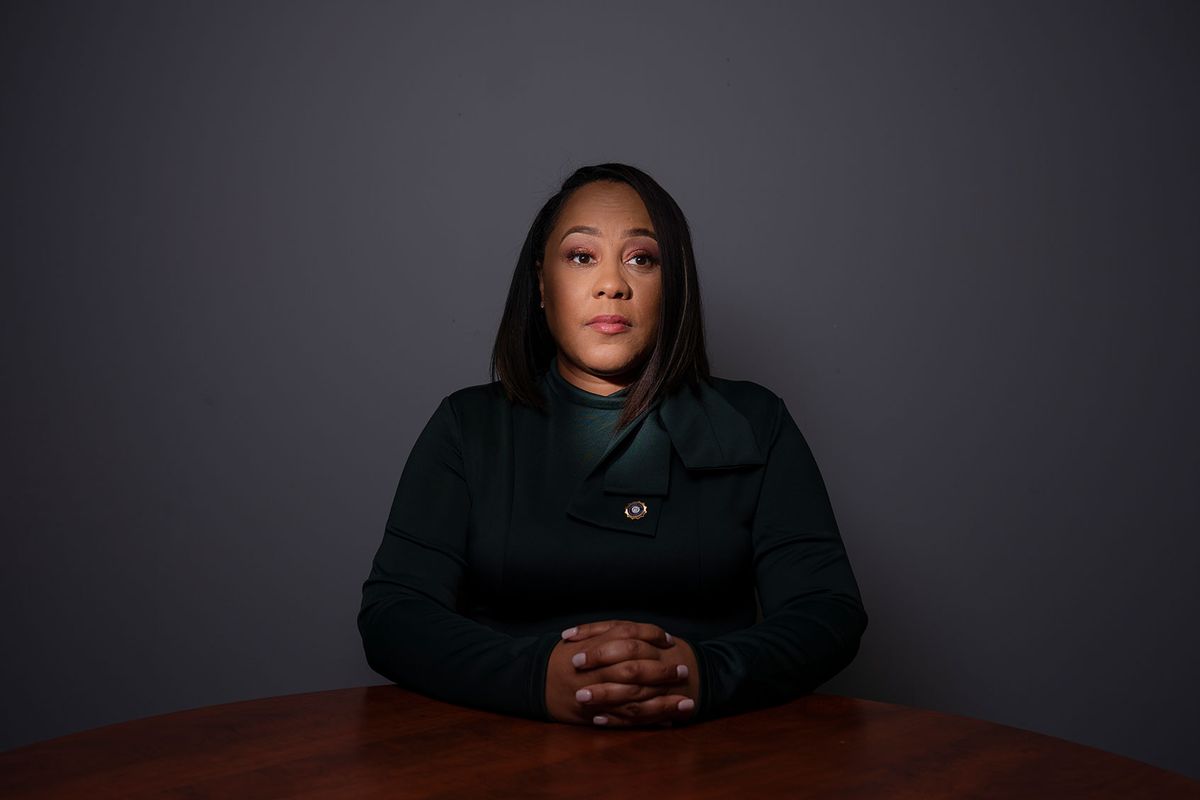“She is ready to go”: Experts say Willis “showing a very strong hand” in motion to speed up trial

Fulton County District Attorney Fani Willis asked a Georgia judge to expedite the trial of all 19 defendants in her sprawling TrumpWorld RICO case after one of them moved for a speedy trial.
Attorney Kenneth Chesebro, one of the architects of former President Donald Trump’s Jan. 6 strategy, demanded a speedy trial under state law. Fulton County Superior Court Judge Scott McAfee set his trial date for October 23, four months ahead of Willis’ proposed date, but stressed in his ruling that the trial date only applies to Chesebro “at this time.”
Willis in a filing on Tuesday asked McAfee to clarify his order, arguing that it is “improper” to automatically sever his case from the other 18 defendants.
“The State of Georgia respectfully requests that the Court set aside its Case Specific Scheduling Order entered on August 24, 2023, to the extent that the Order states, ‘[a]t this time, these deadlines do not apply to any co-defendant,'” Willis wrote.
Georgia’s speedy trial rules require cases to be tried before the end of two court terms following an arraignment. The arraignment of all 19 defendants is set for September 6. Former Trump lawyer Sidney Powell has also moved for a speedy trial, though McAfee has not set a date for her case.
“The State maintains its position that severance is improper at this juncture and that all Defendants should be tried together,” Willis’ filing said, adding that at “an absolute minimum” the court should set the trial for Powell and any other defendant that moves for a speedy trial on the same date as Chesebro.
Willis also asked the judge to set a deadline for all defendants who wish to sever their cases.
Former federal prosecutor Andrew Weissmann, who served on special counsel Bob Mueller’s team, called it a “smart move” by Willis that “amps up pressure on” everyone involved.
“Shows she is ready to go,” he tweeted.
“This is either the best bluff ever or she has pocket aces she hasn’t totally shown yet,” wrote Eric Segall, a law professor at Georgia State University. “[S]he is showing a very strong hand and not giving an inch. Very interesting. Some of the defendants (not Trump) might call her bluff on trials this Fall. I’m betting she’s more than ready (with expert help from my friend John Floyd),” he added.
But former U.S. Attorney Harry Litman called the matter a “very tricky legal puzzle.”
Chesebro effectively sought to sever his case from the others, which is common since defendants may want to tell their own stories or point the finger at others “without others being able to point the finger at them,” he explained. On the other hand, it’s in prosecutors’ interest to try defendants together.
Motions to sever “require a showing from the defendant. It’s not enough that a separate trial will increase your chances for acquittal,” Litman continued. “There must be some built-in unfairness, e.g. a statement admissible against one defendant will also come in against another, even though it wouldn’t in a separate trial.”
Litman predicted it would be “extremely unlikely that the court would order everyone to be tried together at the early date.”
“Among other things, many of the codefendants will say they don’t have time to prepare, and it violates their due process rights. Note, however, that that basically amounts to the position that the GA speedy trial act is unconstitutional as applied,” he wrote. But if a judge rules that Chesebro cannot sever his case, he has a right to a speedy trial date “but no right to be tried independently,” meaning other defendants will remain “joined at the hip.”
“If no defendant — including Trump — can make the requisite showing to sever, that’s their date too,” with the exception of those that sought to remove their cases to federal court, Litman explained.
“Thus the puzzle: it seems beyond the pale that the court would order the other 18 (or however many don’t win removal) to trial in November. But to avoid doing so, the court needs to find that some defendants have made the showing to sever, which is not automatic,” he added. “Perhaps the court will say that the unfairness requiring severance is the abbreviated time schedule itself, but Georgia law provides 3 things a court must consider in deciding a severance motion and that doesn’t really fit into any of them… I don’t envy Judge McAfee here.”
Want a daily wrap-up of all the news and commentary Salon has to offer? Subscribe to our morning newsletter, Crash Course.
CNN legal analyst Elie Honig argued that Willis’ move to try all the defendants at the early date was not a “reasonable request.”
“The prosecutor cannot force people who are unwilling to exercise that right to be tried that quickly,” he said. “I think what Fani Willis is doing here is, A, she’s making a statement, and that’s perfectly appropriate, to say we’re ready on everybody, and B, she’s trying to get clarity from the giant. How many trials will there be and when will they be?”
Fellow CNN analyst Jennifer Rodgers added that there is “no way 19 people can be tried together logistically” but questioned the logic of Chesebro and Powell moving for speedy trials.
“I think it’s actually foolish of the two of them to want to trial in two months, so I think Fani Willis just wants to get a date certain on the calendar for the 17 others, which is also another group she’ll have to thin down before trial because even 17 is just not going to happen logistically,” Rodgers said.
Read more
about the Fulton case


